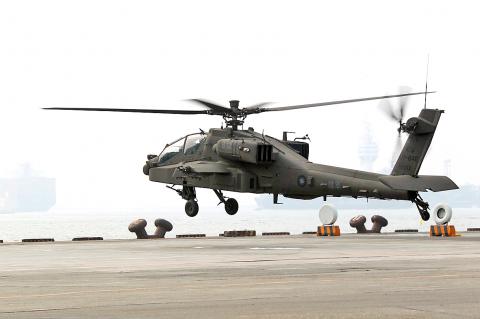Senior Ministry of National Defense officials and other experts said enhanced cooperation arising from the formation of military “sister units” between Taiwan and the US could help counter a possible marine blockade and attack by China’s People’s Liberation Army.
Taiwan’s Aviation Special Forces 601st Brigade, based in Taoyuan, has formed a sister-unit relationship with the Hawaii-based US Army 25th Combat Aviation Brigade, according to a report by the Liberty Times (the sister newspaper of the Taipei Times).
The 25th is a unit of the US 25th Infantry Division of the US Pacific Command, headquartered in Hawaii for military operations in the Asia-Pacific region.

Photo courtesy of the Army Command Headquarters
The Psychological Warfare Battalion Headquarters of the ministry’s Political Warfare Brigade has also formed a sister-unit relationship with the US 7th Psychological Operations Group, which is also part of the US Pacific Command, the report said.
A senior military official was quoted in the report as saying that the US initiated the two military cooperation programs.
The arrangement was made partially because Taiwan’s 601st Brigade was modeled on US Army combat aviation units, using Apache AH-64 attack helicopters, OH-58D Kiowa reconnaissance helicopters and Black Hawk UH-60 utility helicopters, the report said.
Ministry Administrative Deputy Minister Lieutenant General Wang Shin-lung (王信龍) on Wednesday confirmed the development when he responded to questions at a meeting of the Foreign Affairs and National Defense Committee at the legislature in Taipei.
Forming sister units has both symbolic and practical meaning, Wang said.
He did not provide details on the scope of the collaboration.
Ministry spokesperson Major General David Lo (羅紹和) also confirmed the developments, saying: “The defense ministry welcomes the arrangement, since these exchanges can boost the capability of our armed forces.”
He also declined to elaborate on details of the collaborations.
DPP Legislator Tsai Huang-liang (蔡煌瑯) and defense experts said the development communicated a clear political message of an improving relationship between Taiwan and the US, while warning China against any military intentions in the Asia-Pacific region.
“Although the Ministry of National Defense would talk only about the ‘military exchange’ aspect, it is in effect the US’ way of including Taiwan in its military alliance in the region,” Tsai said yesterday. “We see that the US is implementing its strategy with a pivot toward the Asia-Pacific region and US forces are returning to this part of the world in a big way. So this is a very crucial time and Taiwanese must seize this opportunity to enter into a military alliance with US.”
Tsai said it also shows that Washington understands Taiwan’s important and strategic position in the face of China’s growing military strength and potential conflicts over disputed territorial claims.

AIR SUPPORT: The Ministry of National Defense thanked the US for the delivery, adding that it was an indicator of the White House’s commitment to the Taiwan Relations Act Deputy Minister of National Defense Po Horng-huei (柏鴻輝) and Representative to the US Alexander Yui on Friday attended a delivery ceremony for the first of Taiwan’s long-awaited 66 F-16C/D Block 70 jets at a Lockheed Martin Corp factory in Greenville, South Carolina. “We are so proud to be the global home of the F-16 and to support Taiwan’s air defense capabilities,” US Representative William Timmons wrote on X, alongside a photograph of Taiwanese and US officials at the event. The F-16C/D Block 70 jets Taiwan ordered have the same capabilities as aircraft that had been upgraded to F-16Vs. The batch of Lockheed Martin

US President Donald Trump yesterday announced sweeping "reciprocal tariffs" on US trading partners, including a 32 percent tax on goods from Taiwan that is set to take effect on Wednesday. At a Rose Garden event, Trump declared a 10 percent baseline tax on imports from all countries, with the White House saying it would take effect on Saturday. Countries with larger trade surpluses with the US would face higher duties beginning on Wednesday, including Taiwan (32 percent), China (34 percent), Japan (24 percent), South Korea (25 percent), Vietnam (46 percent) and Thailand (36 percent). Canada and Mexico, the two largest US trading

GRIDLOCK: The National Fire Agency’s Special Search and Rescue team is on standby to travel to the countries to help out with the rescue effort A powerful earthquake rocked Myanmar and neighboring Thailand yesterday, killing at least three people in Bangkok and burying dozens when a high-rise building under construction collapsed. Footage shared on social media from Myanmar’s second-largest city showed widespread destruction, raising fears that many were trapped under the rubble or killed. The magnitude 7.7 earthquake, with an epicenter near Mandalay in Myanmar, struck at midday and was followed by a strong magnitude 6.4 aftershock. The extent of death, injury and destruction — especially in Myanmar, which is embroiled in a civil war and where information is tightly controlled at the best of times —

China's military today said it began joint army, navy and rocket force exercises around Taiwan to "serve as a stern warning and powerful deterrent against Taiwanese independence," calling President William Lai (賴清德) a "parasite." The exercises come after Lai called Beijing a "foreign hostile force" last month. More than 10 Chinese military ships approached close to Taiwan's 24 nautical mile (44.4km) contiguous zone this morning and Taiwan sent its own warships to respond, two senior Taiwanese officials said. Taiwan has not yet detected any live fire by the Chinese military so far, one of the officials said. The drills took place after US Secretary